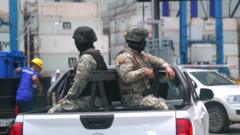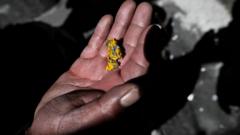This article explores how Ecuador has become a major cocaine export hub, driven by brutal gang violence and international organized crime alongside an insatiable European market.
**Cocaine Trade in Ecuador: The Underbelly of a Global Crisis**

**Cocaine Trade in Ecuador: The Underbelly of a Global Crisis**
The alarming rise of Colombian and Peruvian cocaine trafficking through Ecuador highlights the dire consequences of surging European demand.
The Colombian and Peruvian cocaine trade has increasingly found its way through Ecuador, transforming the country into a vital route for European smuggling operations. Local brazen gangs, primarily run by the Albanian mafia, now control a significant portion of this lucrative trade, leveraging Ecuador’s unique geographical and economic situation to expeditiously move drugs to the thriving European market.
Ecuador’s President Daniel Noboa has acknowledged that approximately 70% of the world's cocaine flows through the nation despite it not being a source of production. Gangs capitalize on the existing banana export industry, with around 66% of containers shipped abroad carrying legitimate produce, providing a critical cover for drug transportation.
César, a former gang member, recounts harrowing experiences involving threats to life if he refused to cooperate with his Albanian employers, revealing the harsh realities of daily life in crime-ridden Ecuador. Many workers, like César, are coerced into the trade, with devastating consequences resulting from persistent consumer demand in Europe and elsewhere.
Alarming statistics signal an increase in gang-related violence in Ecuador, with January 2025 recording 781 murders—many attributable to the drug trade. As struggles against organized crime intensify, local law enforcement faces insurmountable challenges, with police operations constantly disrupted by corrupt practices in the industry.
The influx of Albanian gangs has taken place alongside rising exports and increased drug-related violence in Ecuador. Authorities have anticipated this connection but have been slow to respond to the evolving landscape of the drug trade. Legal and commercial operations now often serve as mere fronts to facilitate illicit drug trafficking, raising concerns regarding national security and the economy.
As global cocaine consumption reaches unprecedented levels, Ecuador's experience serves as a stark reminder of the broader implications of drug demand. Law enforcement advocates stress the need for consumer nations to take accountability for their role in fueling the crisis, while also calling for stringent measures against organized crime networks.
This grim reality highlights the urgent necessity for collaborative international efforts to address drug trafficking at both ends of the supply chain—an appealing proposal echoing from Ecuador’s highest offices down to the streets impacted by violence and addiction.
Ecuador’s President Daniel Noboa has acknowledged that approximately 70% of the world's cocaine flows through the nation despite it not being a source of production. Gangs capitalize on the existing banana export industry, with around 66% of containers shipped abroad carrying legitimate produce, providing a critical cover for drug transportation.
César, a former gang member, recounts harrowing experiences involving threats to life if he refused to cooperate with his Albanian employers, revealing the harsh realities of daily life in crime-ridden Ecuador. Many workers, like César, are coerced into the trade, with devastating consequences resulting from persistent consumer demand in Europe and elsewhere.
Alarming statistics signal an increase in gang-related violence in Ecuador, with January 2025 recording 781 murders—many attributable to the drug trade. As struggles against organized crime intensify, local law enforcement faces insurmountable challenges, with police operations constantly disrupted by corrupt practices in the industry.
The influx of Albanian gangs has taken place alongside rising exports and increased drug-related violence in Ecuador. Authorities have anticipated this connection but have been slow to respond to the evolving landscape of the drug trade. Legal and commercial operations now often serve as mere fronts to facilitate illicit drug trafficking, raising concerns regarding national security and the economy.
As global cocaine consumption reaches unprecedented levels, Ecuador's experience serves as a stark reminder of the broader implications of drug demand. Law enforcement advocates stress the need for consumer nations to take accountability for their role in fueling the crisis, while also calling for stringent measures against organized crime networks.
This grim reality highlights the urgent necessity for collaborative international efforts to address drug trafficking at both ends of the supply chain—an appealing proposal echoing from Ecuador’s highest offices down to the streets impacted by violence and addiction.




















